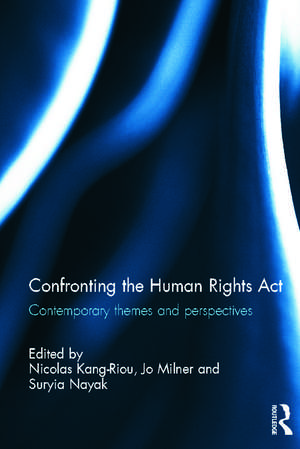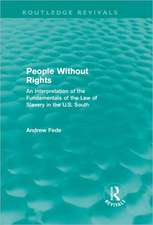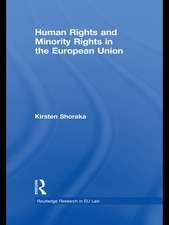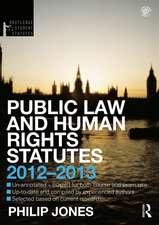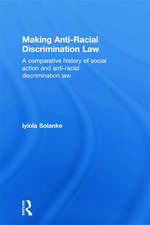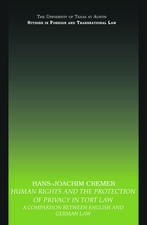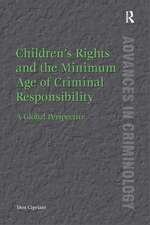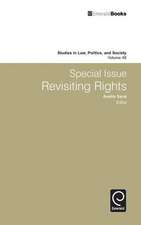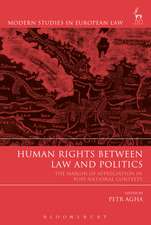Confronting the Human Rights Act 1998: Contemporary themes and perspectives
Editat de Nicolas Kang-Riouen Limba Engleză Hardback – 13 mar 2012
Confronting the Human Rights Act 1998 will be of particular interest to scholars and students of Law, International Studies and Political Science.
Preț: 1067.14 lei
Preț vechi: 1301.39 lei
-18% Nou
Puncte Express: 1601
Preț estimativ în valută:
204.19€ • 213.77$ • 168.96£
204.19€ • 213.77$ • 168.96£
Carte tipărită la comandă
Livrare economică 07-21 aprilie
Preluare comenzi: 021 569.72.76
Specificații
ISBN-13: 9780415674706
ISBN-10: 0415674700
Pagini: 346
Dimensiuni: 156 x 234 x 21 mm
Greutate: 0.81 kg
Ediția:1
Editura: Taylor & Francis
Colecția Routledge
Locul publicării:Oxford, United Kingdom
ISBN-10: 0415674700
Pagini: 346
Dimensiuni: 156 x 234 x 21 mm
Greutate: 0.81 kg
Ediția:1
Editura: Taylor & Francis
Colecția Routledge
Locul publicării:Oxford, United Kingdom
Public țintă
PostgraduateCuprins
Introduction, Nicolas Kang-Riou, Jo Milner and Suryia Nayak 1. Confronting the legalisation of human rights: a counterpoint, Nicolas Kang-Riou Part 1:Confronting the HRA as a legal tool 2. The HRA: origins and intentions, Francesca Klug 3. High points and low points in the first 10 years: a view from the Bench, Lady Hale 4. Human rights protection in Australia: the Commonwealth's odd one out?, Michael Kirby 5. Inspired by the HRA: the Victorian Charter of Human Rights and Responsibilities, Diane Sisely Part 2: Topical confrontations of the HRA 6. The HRA in an age of terror, Irene Kahan 7. "Repatriating" Churchill's legacy, Keith Ewing 8. Limits and achievements of the HRA from the socio-economic point of view: the HRA, poverty and social exclusion, Alice Donald and Elizabeth Mottershaw 9. The Human Rights Act and assisted suicide: the (most) unkindest cut of all?, Jo Milner and Lisbeth Bourne Part 3: Activist Confrontations 10. What potential does the HRA hold for domestic violence groups?, Ronagh McQuigg 11. Feminism, women, rape and social change, Catherine Little and Kate Cook 12. Testimony, tolerance and hospitality: The limitations of the HRA in relation to asylum seekers, Suryia Nayak and Revive & The Salford Forum for Refugees & People Seeking Asylum United for Change Campaign Group 13. The politics of protest and the HRA, Peter Tatchell 14. Blacklilsting of trade-unionists: What is the point of human rights law?, Dave Smith and Keith Ewing Part 4: The future? Confronting the Bill of Rights 15. Security, citizenship and responsibilities beyond the HRA: Towards a British Bill of Rights and Responsibilities in the UK 16. The HRA or a British Bill of Rights: Riding back on human rights' protection?, Helen Fenwick
Descriere
This book sets out to critically examine the Human Rights Act 1998 (HRA) and evaluate its impact from a multi-disciplinary perspective in the ten or so years since the HRA came into force. It includes both a domestic and international analysis of the effectiveness of the HRA as well as considering future developments in policy and practice and the concept of a British Bill of Rights.
The contributors to the volume come from different spheres and include members of the bench in the UK and Australia, academics, researchers, member of NGOs, and campaigners as well as people giving testimony of lived experience in relation to the Human Rights Act, resulting in a book which draws out the connections between the legal framework, the theory, and also the actual experience of the protection afforded by the HRA.
The contributors to the volume come from different spheres and include members of the bench in the UK and Australia, academics, researchers, member of NGOs, and campaigners as well as people giving testimony of lived experience in relation to the Human Rights Act, resulting in a book which draws out the connections between the legal framework, the theory, and also the actual experience of the protection afforded by the HRA.
